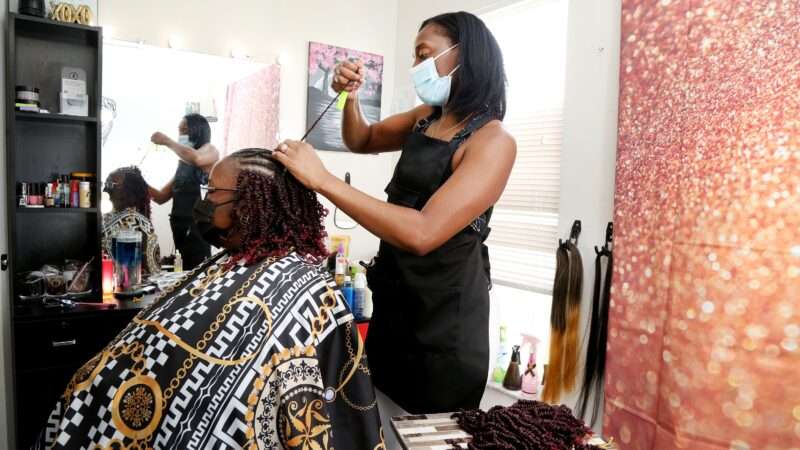
Wisconsin hair braiders may no longer need a permission slip from the government to make a livelihood using their skills. In June, the state legislature passed a bill to allow people to professionally braid hair without a license. The measure now awaits Gov. Tony Evers’ signature.
Wisconsin follows a number of states in the past decade that have begun allowing unlicensed braiding—either through legislative action or after a court ruled the license rules unnecessary. These include Mississippi, Rhode Island, Utah, and Washington.
While it was not explicitly stated in any previous Wisconsin law that hair braiders needed to be licensed, Wisconsin rules do require a license in order to be a professional barber—with “barbering” defined as “for compensation, arranging, styling, dressing, shampooing, cleansing, curling, dyeing, tinting, coloring, bleaching, waxing, waving, straightening, cutting, shaving, trimming, relaxing, singeing, or performing similar work upon the hair of the head, neck, or face of any person by any means.”
The new law would revise the state’s definition to explicitly say that “barbering” does not include “natural hair braiding,” which it defines as “twisting, wrapping, weaving, extending, locking, crocheting, or braiding hair”—whether natural or synthetic—”by hand or with a mechanical device.”
This would exempt natural hair braiders from the extensive training required of licensed barbers.
“Equity is about opening opportunities, and removing barriers,” said Rep. Shelia Stubbs (D–Madison), one of the bill’s sponsors in the House, in a statement. “This legislation will allow for more individuals, especially female entrepreneurs, to practice the art of natural hair braiding without unnecessary training. [It] removes restrictions and opens opportunities for hair braiders in our state, many of whom are Black women. This will not only improve their economic lives, but also stimulate our state’s economy as a whole.”
Natural hair braiding has long been practiced by black Americans as a natural way to style hair, with knowledge being passed down informally in families or communities. Licensing requirements make it unnecessarily difficult for hair braiders—who are primarily black women—to use this knowledge to become entrepreneurs.
“We shouldn’t have to go to school just to get licensed just to do something that’s always been in our household, what we grew up learning and is so natural to us,” Kiara Allen, owner of Kashis Cheveux salon in Madison, Wisconsin, told WMTV.
Barber licensing requirements are supposedly in place to ensure consumer safety. But natural hair braiding is a low-risk process that requires no heat or caustic chemicals
The Institute for Justice (IJ), an advocacy group that has sued state governments on multiple occasions over hair-braiding licensing, noted in a 2016 report that in Washington, D.C., and the nine licensure states that responded to a request for information, there were 9,731 licensed or registered hair braiders and only 103 complaints filed against them—by either a customer, another licensee, or a member of a cosmetology licensing board—from 2006 to 2012. Only four of these complaints were about health and safety concerns; the rest were about the fact that the hair braiders were unlicensed. Just one came from a customer.
“Higher barriers to entry for braiders bring few benefits to the public, but
they do carry costs,” finds the IJ report. “States with more onerous licenses tend to have fewer braiders than states with less onerous ones…The states requiring 100 hours or fewer of training for their specialty licenses or registration had more braiders than the states requiring 300 hours or more—and most of these differences were statistically significant. These results suggest that more burdensome licensing regimes may be shutting braiders out—or driving them underground—without improving health and safety outcomes.”
from Latest – Reason.com https://ift.tt/3hdH9R2
via IFTTT